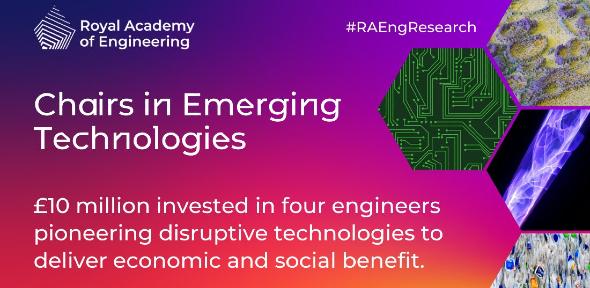
Four innovative engineering academics who are global leaders in their fields have each been awarded a Royal Academy of Engineering Chair in Emerging Technologies. They will share a total of £10 million in funding over ten years to lead on developing emerging technologies with high potential to deliver economic and social benefits to the UK.
This scheme aims to identify and provide long-term support to global research visionaries, developing emerging technology areas that have potential to deliver economic and social benefit to the UK.
From atomically thin semiconductors for more energy efficient electronics, to harnessing the power of the sun in the upcycling of biomass and plastic waste into sustainable chemicals, their research encompasses a variety of technological advances with the potential to deliver wide-ranging benefits.
The four Chairs and their research projects are:
• Professor Manish Chhowalla FREng, University of Cambridge
Atomically thin semiconductors: An emerging platform for ultra-low power electronics
Professor Chhowalla aims to engineer ultra-low-power electronics based on wafer scale manufacture of atomically thin (or 2D) transition metal dichalcogenide semiconductors. The atomically thin nature of the 2D semiconductors makes them ideal for energy efficient electronics. To reap their benefits, complementary metal oxide semiconductor processes will be developed for their integration into ultra-low power devices such as tunnel and ferroelectric field effect transistors.
• Professor Erwin Reisner, University of Cambridge
Solar-powered upcycling of biomass and plastic waste to sustainable chemicals
Professor Reisner will develop an emerging technology called solar reforming that creates valuable sustainable fuels and chemicals from biomass and plastic waste. This solar-powered technology uses only waste, water and air as ingredients, and the sun powers a catalyst to produce green hydrogen fuel and platform chemicals to decarbonise the transport and chemical sectors. This project aims to drive the lab-to-market transition of solar reforming and, ultimately, to establish a commercial solar chemistry technology for a circular economy.
• Professor Nicholas Lane, University of Cambridge
DANTE: Decentralized AI Open Technology
Professor Lane, and his team, aim to fundamentally change the way the world approaches machine learning (ML) and enable AI to be far more collaborative and open than is possible today. Project DANTE seeks to invent, popularise and open-source scalable decentralised forms of ML that will be capable of (1) allowing the safe and privacy-preserving usage of previously untapped sources of distributed data, and (2) the efficient and secure sharing of computing resources towards widening participation in ML – even at extreme levels of complexity.

